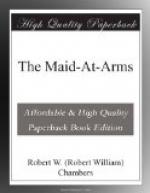Standing, the better to observe the hall on all sides, it came to me that some one had stripped a fine English mansion of fine but ancient furniture, to bring it across an ocean and through a forest for the embellishment of this coarse house. For there were pictures in frames showing generals and statesmen of the Ormond-Butlers, one even of the great duke who fled to France; and there were pictures of the Varicks before they mingled with us Irish—apple-cheeked Dutchmen, cadaverous youths bearing match-locks, and one, an admiral, with star and sash across his varnish-cracked corselet of blue steel, looking at me with pale, smoky eyes.
Rusted suits of mail, and groups of weapons made into star shapes and circles, points outward, were ranged between the heavy pictures, each centred with a moth-ravaged stag’s head, smothered in dust.
As I slowly paced the panelled wall, nose in air to observe these neglected trophies, I came to another picture, hung all alone near the wall where it passes under the staircase, and at first, for the darkness, I could not see.
Imperceptibly the outlines of the shape grew in the gloom from a deep, rich background, and I made out a figure of a youth all cased in armor save for the helmet, which was borne in one smooth, blue-veined hand.
The face, too, began to assume form; rounded, delicate, crowned with a mass of golden hair; and suddenly I perceived the eyes, and they seemed to open sweetly, like violets in a dim wood.
“What Ormond is this?” I muttered, bewitched, yet sullen to see such feminine roundness in any youth; and, with my sleeve of buckskin, I rubbed the dust from the gilded plate set in the lower frame.
“The Maid-at-Arms,” I read aloud.
Then there came to me, at first like the far ring of a voice scarcely heard through southern winds, the faint echo of a legend told me ere my mother died—perhaps told me by her in those drifting hours of a childhood nigh forgotten. Yet I seemed to see white, sun-drenched sands and the long, blue swell of a summer sea, and I heard winds in the palms, and a song—truly it was my mother’s; I knew it now—and, of a sudden, the words came borne on a whisper of ancient melody:
“This for the
deed she did at Ashby Farms,
Helen of Ormond, Royal
Maid-at-Arms!”
Memory was stirring at last, and the gray legend grew from the past, how a maid, Helen of Ormond, for love of her cousin, held prisoner in his own house at Ashby-de-la-Zouch, sheared off her hair, clothed her limbs in steel, and rode away to seek him; and how she came to the house at Ashby and rode straight into the gateway, forcing her horse to the great hall where her lover lay, and flung him, all in chains, across her saddle-bow, riding like a demon to freedom through the Desmonds, his enemies. Ah! now my throat was aching with the memory of the song, and of that strange line I never understood—“Wearing the ghost-ring!”—and, of themselves, the words grew and died, formed on my silent lips:




